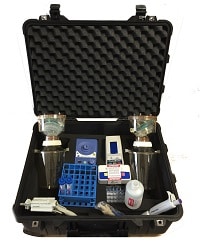Water microbiology specialists Aqua-tools have delivered the first in series of 30 state-of-the-art Rapid ATP Ballast Water Monitoring Systems to SGS Group.
The Geneva-based testing and certification body has agreements in place with several countries to inspect and monitor the treated ballast waters of vessels entering their ports, the latest of which is The Kingdom of Saudi Arabia.
Vessels discharging ballast water in Saudi Aramco ports will be required to present a ballast water report and sample from 16 August 2017.
Dr. Vladimiro Bonamin, Vice-President, Global Business Development Manager, SGS Groups, said: “With the entry into force of the Ballast Water Management Convention next month, ballast water monitoring will become an important aspect of the port state control function, as inspectors test treated water for compliance. aqua-tools, in collaboration with SGS Group (Switzerland) and LuminUltra (Canada), has developed a Rapid ATP technology designed to be the most reliable and effective ballast water monitoring solution on the market.”
According to Bonamin, existing bioluminescence methodologies used to monitor Adenosine Tri-phosphates (ATP), a molecular structure, like DNA, that is found in all living organisms, “are ineffective in high salinity waters and while an accepted method for testing surface waters, these rudimentary solutions do not provide a reliable tool with which to test the efficacy of ballast water treatment systems”.
Marc Raymond, Managing Director, aqua-tools, said: “Our test protocol is based on the bioluminescence principle, whereby the proportion of light correlates exactly with the number of Adenosine Tri-phosphates found in ballast water. Other luminometers measure the light but these use a very rudimentary measurement ‘pen’ to take a small sample of the water. This is ineffective since the reagent required to extract the ATP from the organism is heavily diluted and does not provide an accurate measurement from which to assess efficacy across the entire spectrum specified in the IMO D2 parameters list.
“We have developed a unique method for extracting the ATP from the cell walls of all marine organisms, including those with hard shells, in a process that takes just five minutes. Our method analyses each fraction: >50µm (most often zooplankton), 10-50µm (most often phytoplankton) and bacteria, which other ballast water monitoring systems struggle to achieve.”
“While much focus has been given to the ballast water treatment system, there has been little discussion about enforcement,” said Bonamin. “Existing ballast water testing methods could mean that incorrect measurements are taken, resulting in heavy financial penalties for shipowners. We now have the technology available to provide 100% indicative but accurate readings more or less immediately, without having to send samples off to laboratories.”
aqua-tools’ ATP 2G technology can be used onboard vessels and by enforcement agencies to rapidly analyse treated waters onboard vessel during the deballasting process, providing results in less than 40 minutes.
SGS Group now has agreements in place to implement ballast water compliance verification tests and certification in seven countries, with the service available in USA, Canada, South Africa, Germany, Italy, Spain, Belgium, the Netherlands, Finland, UAE, India, China, South Korea, Australia, Thailand and Taiwan.
The 30 Rapid ATP Ballast Water test kits will now be distributed to SGS Group offices in all those countries by which it has been contracted to carry out ballast water verification tests.

